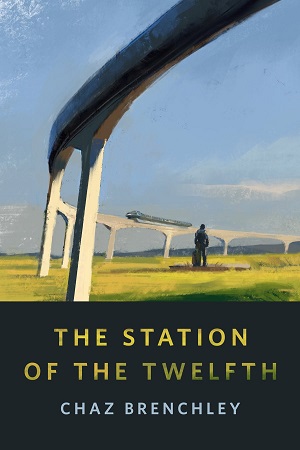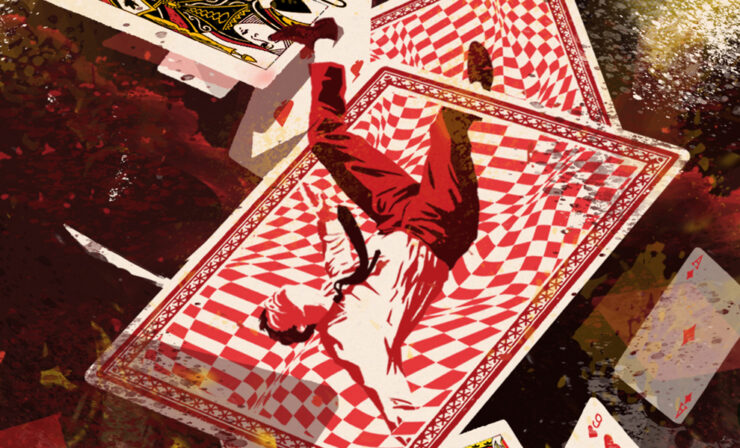In this Martian city, each stop along the monorail has a purpose behind its namesake. However, none are quite like the Station of the Twelfth, and if you decide to visit, you’ll be sure to learn why.
We’ve a monorail now that loops the whole of Cassini Crater, with stations all the way around. Not that the city’s reached that far, by half; most of the stations offer little more than a waymarker as yet, and the trains don’t actually stop at those unless there’s someone there to wave them down. But they’re there, ready for when the city catches up on its slow crawl around the rim: marked, mapped, and charted. And, even more importantly, even more potently, every single one of them is named.
For some, generally those that have always lain within the city’s narrow bounds, their names are plain and obvious, as declaratory as those on the London Underground: Thunder Falls, City Hall, Cathedral. They tell you where they are, and nothing more. As though they were a map themselves, on a scale of one to one.
Stay on the train, though, ride to the outskirts at either end of our crescent city, where the stations were marked out and the tracks in situ before ever the builders arrived. Now the station names grow more fanciful, some baroque and some farouche. Perhaps a miner staked a claim here back in the long ago, in the days of Happy George, and someone felt that he should be remembered; so we have Corfe’s Drift, and the Gap of Rags, and more. Perhaps a wagonload of pioneers and their army escort faced down a naiad, and the memory of blood remains; hence Baker’s Hell and Drowned Sorrow. We have many like that, meaningless in the context of what’s there now, but never mind. The stations give their names to their districts as the city swallows them down, like ink spilling across a page.
Farther out and farther round, where no city planner or architect has yet cast so much as a covetous eye, where all of Arabia Terra spreads before you and below you and the great lake sits patient at your back, quite undisturbed—well, here there is no known history to latch to and the names grow more self-consciously absurd, or more obscure. Sainted Aunt, anyone? Or Bletherspike, or Caryatid’s Curse, or Somnolence and Sleep, the two stations farthest out, that will presumably be the last we reach. Someone, some clerk in the engineers’ office was young at heart and foolish, having fun, and someone let them. So be it. Who remembers from where Paddington had its name, or Knightsbridge, or Shepherd’s Bush? They come to mean where they are, and that’s enough.
Here, though, at Cassini, the most obscure name on the line is the plainest of them all. We called it the Station of the Twelfth, and you’d never know why unless you asked. The full name is there on the signboard to greet you as you step down to the platform, but there’s no placard to explain it, such as we have at other stations, where we think they might be needed. Perhaps we want you to ask. Perhaps we feel that you should have to, it matters that much to us.
Perhaps it’s our story, and we want to tell it directly, face-to-face.
There’s always someone around who can do that. Not an employee; this isn’t their job. Sometimes it’s an old man, retired; he might wear a uniform. He might have been a railwayman before, and was almost certainly a soldier before that. Or maybe it’s a woman come from church; she does the flowers, maybe, on a Wednesday before choir practice, and then comes here to sit for an hour on the bench, in case someone asks.
Sometimes it’s a child after school: no little kids, but teenage, somber, dutiful. They like to sit their turn.
If there’s a roster, it’s informal and I don’t know where it’s kept, who keeps it. This seems less organized than that, and more instinctive. People check, I think, as they pass, when they have free time. If the previous tenant has been there long and long with errands waiting, they just take over. Should no one come to relieve them, they’ll wait for the last train just in case, but someone always comes. Sometimes more than one. It is also the case that teenagers like to smoke an illicit cigarette, sip a beer, talk with their friends late into the night. If a kid says they’re going to the station, few parents would stand in their way. Perhaps they’d go along themselves: there are two platforms, after all, two benches. They can watch, not interfere. Be ready for the question, should it come.
If you don’t ask and don’t already know, you’d be hard-pressed to learn it. The station occupies a rare gap in our slow-circling city; from the lake’s edge to the rocks of the rim, here nothing is built for a quarter mile north and south of the station. You could call it a park, I suppose, one like a dozen others—except that this is nothing like those others. There are no trees, no swings or slides or climbing frames, no paths marked out, no ponds. Only a swathe of bare and empty grass, meticulously mowed, water’s edge to rocky rise. No one comes to picnic here, no one comes to play. When people do come—and they do—it’s reverential. There ought to be a monument, perhaps. There isn’t. The place itself is monument enough. It speaks to absence as much as it does to memory, to loss.
That’s not what the teenagers say, no. That’s what I say. They have their own story, and tell it as they will.
Here you are, unhelped, unguided, as you are meant to be. As you are meant to come. And here am I, on the platform, waiting. Ready. As I am meant to be. Perhaps we were meant to meet; there may be fate in this.
Buy the Book


The Station of the Twelfth
#
Perhaps you came from Earth, as plenty do. They visit what sites they can, what time they have—and they always come to Cassini. Who would not? This is the wonder of our age, this catenary city, the first wonder of a new world. Some of those visitors come out this far, some few. The ones who know, of course they come; and the ones who hear a whisper, who are drawn by knowing that there’s something they don’t know. Those are the ones who ask. They’re the ones we’re here for.
And you. I’m here for you.
Nothing on the platform here, no, except that sign, that name, the Station of the Twelfth.
Look this way to the water, look that way to the crags: nothing but this break in the city’s run, this band of greensward, unrelieved. As though the city wore a mourning band, perhaps. Except in green.
Yes, of course you may step down to the grass below the platform. See the stairs? I’ll come with you. Take my arm.
Yes, we’ve left the station now; and yes, this is still the Station of the Twelfth.
Here’s a bench. Let’s sit and look awhile. No need to speak.
#
Yes, of course the stillness is the point. Even the lake traffic takes a dogleg here, a wide way around. You’ll never see a fisherman on the lake path, or a schoolboy in training running by. The city stops here, on both sides; people turn back. Only the train runs through.
We could walk farther, yes: all the way to the water, if you cared to. Or all the way to the rim. One doesn’t, though. It isn’t done. These benches are enough, with the view they offer. Technically this is hallowed ground, and none of us disturb it. No one brings their dogs.
It’s land in waiting, do you see? Blessed by the archbishop, consecrated, holy. Waiting.
What it waits for, that can never come. Cassini will always have this gap, this emptiness. A hole in the heart, people like to say, some people.
I prefer to be less poetic, by and large. Yes, of course I’m going to tell you. Here and now.
You’re from Earth, perhaps; you’re British, almost certainly. You may see the late war, the Great War as a victory. You may well do that, for all your many losses. On Earth, perhaps, it was. The Czar gave up so much territory, influence, reputation; the Empire is stronger now on all our borders, a more potent voice across the world.
It wasn’t like that here. When the war came to Mars, we lost it. Not catastrophically, to be sure, but it was only the collapse of the Czar’s allies back on Earth that saved us. However much he wants Mars—and who wouldn’t, rather than the hell that is Venus?—he wants even more to save his own land, his own crown and titles. If he is not Emperor of All the Russias he is nothing at all. So he pulled back, he signed the Armistice, he sits and sulks in Saint Petersburg while the British crow triumphant on the Ottoman dunghill—but Russian soldiers still hold both our Martian moons, Russian intelligencers peer down on us through our own unmatched abandoned telescopes, there are spies and traitors all throughout our colony. We have all the planet to ourselves, and can never feel safe.
We try not to look up at the moons, but they’re hard to ignore, and it is harder yet not to remember what they mean as they chase across our skies. Defeat, yes: and more than that. Of course, more than that. Defeat is a weasel word, suggesting loss of territory, of sovereignty, of prestige and power and control.
What you lose in war, of course, is people.
Our retreat from the two moons is legendary, commemorated in song and story, a part of our history now and our folklore too. There is triumph in it, because this is Mars and we celebrate survival as by instinct, this is what we do; and there is sacrifice in it, because this is Mars, and everything we have and are is built on bones, and we never can forget that.
The Twelfth Battalion of the Queen’s Own Martian Borderers, our very own regiment: they made their stand on Deimos, while the last transports flew the last divisions away from there and brought them home. The word we had, they gathered about their colors and stood fast. Not one made a run for safety; not one has been returned to us, alive or otherwise. They would have died to the last man sooner than surrender. That much we know. And this also we know, that the Russians had no way to return them, dead. The merlins would refuse to carry bodies in an aethership; the way we treat our dead appalls them deeply. Their own they eat, as a rule, or let them lie where they fell. The Charter allowed us one graveyard, one, for all the province; that is close to full now, for all its size. We think, we hope they just don’t understand our crematoria, which have proliferated now perforce all through the colony.
When challenged about the Twelfth, the Russians will say only that the matter has been attended to, with great regret. Our best guess is that they built their own crematorium for the purpose, there on Deimos. What they did with the ashes, we cannot know.
So we made this, the Station of the Twelfth: here is their last posting, this cemetery to which they can never come. Its very emptiness speaks louder than tombstones ever could, however many. It embraces the city like a mourning band, for the Twelfth were local lads, the battalion raised and barracked here.
Every day the monorail brings passengers, some few; more come by steamer across the lake to the landing stage below. They come to remember, to salute, simply to sit awhile. In that ironic tradition that is ages old, it is a place of peace, this monument to war.
Every day except one day, at least.
Armistice Day is observed all across the Empire, and nowhere more devotedly than here on Mars. Every parish holds its church parade, where veterans and serving soldiers and children of the Pioneer Corps march all together in their companies, banners aloft and uniforms immaculate, bands to bring them home. They march from their church to the village square or the town hall or the fairground, wherever can hold them all, from all the churches nearabout; if there’s a clock, so much the better. If not, some places ask the army to bring a cannon, and the vicar will always have a watch.
There’s a clock above the tracks here at the Station of the Twelfth, and it’s Janus-faced, inward and outward, so that it can be read from either platform and farther yet—but it’s not a striking clock, so the army brings a cannon anyway. Cadets vie for the privilege of towing it from the city armory, while their comrades and their superiors, their pensioners and their younger kin face the long march—for this day no one rides the train but the old, the infirm, the very young—from St. Michael’s parish church some miles off.
Everyone able and entitled, whoever has worn the uniform, will join that march and wear it once again, proud and solemn in the double red of the Queen’s Own, scarlet and madder, medals and badges ablaze. Even some number of the tenors and basses of the church choir will be in uniform today, as the vicar is himself, under the envious eyes of the boys in the treble and alto ranks, who will spend this day at least pining for their voices to break and their own chance to serve.
Every church parade draws its crowd, but this draws more than most. They line the lake path from church to cemetery, cheering all the way; as soon as the last company has passed by—veterans in wheelchairs, these, pushed by volunteers, cadets again—the people swarm behind, all but silent now. The bands won’t play on this parade, not before their time.
Hushed, then, the crowds follow the marchers, all the way to the Station of the Twelfth; and here, this one day, the troops in uniform array upon the grass, for there’d never be room else. The people pack around, leaving space enough, just space enough.
Everyone’s early. There’s an hour yet, before the time. That’s why they’re here now.
All the various bands, church and school and military, form up together under one baton. A bugle blows a long and solitary, a warning note, to suppress the least amount of chatter in the audience; then comes a drum roll, and then at last the National Anthem. On Mars we call it the Imperial Anthem, and it’s not only naughty schoolchildren who will sing “Empress” instead of “Queen,” for all that it fudges the scansion.
That duty, that loving duty done, a solitary boy steps forward in his white surplice, draws breath, waits for his cue and sings unaccompanied our own alternative and thoroughly unofficial anthem, “Red, Red, White, and Blue,” followed by the first verse of the lament written expressly for the Queen’s Own in their sorrow, “If They Should Fall for Ever.” His own choir joins him for the first chorus; all the massed soldiers sing the second verse; and now at last it’s the people’s turn to join in for the remainder. It has been said that all the city sings this song, this day.
And once Martians have begun to sing—well. Only a fool would try to stop them. The Empire is not short of patriotic songs, the church of hymns, nor the army of marches, and we know them all. There won’t be time to sing them all, but we’ll sing the hour away.
And fall silent with no prompting when it’s due, when the bands put down their instruments and stand as solemnly to attention as the soldiery, when all eyes turn to the vicar on his plinth. He turns to the officer at his side, who turns to the cadets grouped around their field-gun and raps out, “One round, fire!”
And at the precise minute we are here to mark, the gun booms out its own ironic message, the bellow that calls for another kind of silence; and there are echoes coming back across the water, but they only add to its quality, this two minutes’ silence of ours, in remembrance of those lost.
Soon the trains will run again, and those too tired for the walk will ride home in comfort and for free, this one day of the year. The military of course will march in retreat, and all but the littlest Pioneers too; and now the bands will play every step of the way, and half the crowd will follow, and there may be more jaunty and less solemn singing along, there may well, yes.
And that’s where the Twelfth keep their station now, and that’s why.
Buy the Book


The Station of the Twelfth
“The Station of the Twelfth” copyright © 2021 by Chaz Brenchley
Art copyright © 2021 by Gregory Manchess














